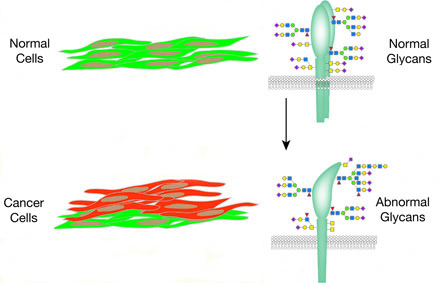The National Cancer Institute has awarded Emory $2.5 million over five years in two cooperative grants to support research on the distinctive sugary coatings of cancer cells. The work is expected to lead to new diagnostic techniques for cancer and possibly new anticancer therapies.
One project is an award to Richard D. Cummings, PhD, William Patterson Timmie professor and chairman of biochemistry, and Tongzhong Ju, PhD, associate professor of biochemistry. Both are members of the Winship Cancer Institute.
All human cells have a fuzzy outer coat consisting largely of glycans, or carbohydrates bonded to proteins or lipids. Cummings and Ju’s study will focus on an alteration in this outer coat, known as Tennessee or “Tn” antigen, which is detectable chemically on more than 80 percent of human colorectal cancers. Cummings and Ju previously discovered that changes in the enzyme Cosmc cause these tumor-specific alterations in the glycan coat. They and their colleagues have developed antibodies against Tn antigen, which could form the basis for enhanced detection and eventually, treatment of colorectal cancer.
Emory scientists have also been pioneers in developing technology for analyzing the patterns of glycans on and within cells. Glycans are more difficult to study, in comparison with DNA and proteins, because glycan chains are connected in a variety of complex, branched ways. “Shotgun glycomics” is a method developed by David F. Smith, PhD, professor of biochemistry and director of Emory’s Glycomics Center, and Cummings to rapidly analyze the spectrum of glycans found in tissue or tumor samples.
The second award is to Smith and Brian Haab, PhD, associate professor in the Center for Cancer Genomics and Quantitative Biology at the Van Andel Institute in Grand Rapids, MI, and involves Cummings as a co-investigator. Their project deals with pancreatic cancer and identifying unique glycan structures and antigens, important in pancreatic cancer progression and dissemination.
The grants were awarded as part of the Alliance of Glycobiologists for the Detection of Cancer, a NCI-supported consortium of eight tumor glycomics laboratories. The AGDC involves several parts of the NIH, such as the National Institute for General Medical Sciences and the National Heart Lung and Blood Institute, because of the crosscutting nature of its scientific applications.

